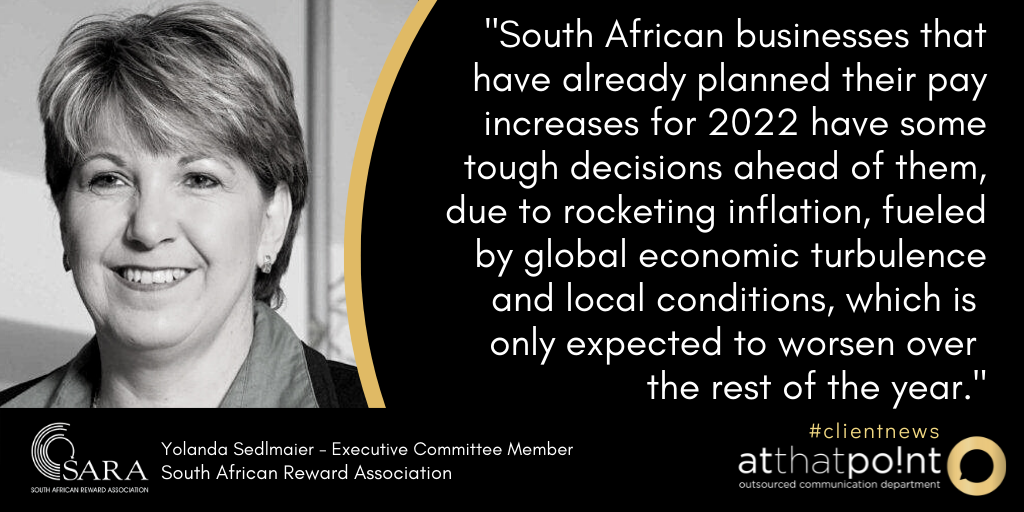|
"South African businesses that have already planned their pay increases for 2022 have some tough decisions ahead of them," warns Yolanda Sedlmaier, Chartered Reward Specialist and Exco member at the South African Reward Association.
This is due to rocketing inflation, fuelled by global economic turbulence and local conditions, which is only expected to worsen over the rest of the year. Employees faced with the escalating cost of living may be underwhelmed and demotivated by increases falling well below their needs. Unfortunately, this can negatively affect their productivity as well as that of their company. A rough road ahead South African employers determine their pay increase targets several months before those increases are due to be implemented. The targets are typically based on various factors, including the prevalent economic outlook for the coming year at that time. Once set, sudden changes to the forecast factors are very difficult to accommodate due to the time needed to rework the plans and the financial provisions supporting their adoption. "The process is the definition of a big ship turning slowly and 2022 is shaping up to be just that kind of situation," says Sedlmaier. According to recent figures from Statistics South Africa, the country's current annual inflation is 5.9 percent, mainly due to higher food and fuel prices. This is compared to 4.5 percent in 2021. In addition, credit rating firm Moody's has projected that local inflation could reach as high as 8 percent by the end of the year, a figure the US economy has already reached. To offset inflation, the South African Reserve Bank (SARB) has announced an increase to the interest rate of 50 basis points, following three consecutive rises of 25bps each. The SARB also noted that economic growth had been adjusted from 2 percent down to 1.7 percent due to several short-term factors, including flooding in Kwa-Zulu Natal and ongoing electricity supply constraints. The sudden onset of Russia's war with Ukraine and the conflict's immediate impact on the global economy is also a significant factor. This while businesses are still fighting back from the effects of the COVID-19 pandemic throughout 2020 and 2021. Lastly, economists report that while the outlook for a global recession was 25 percent at the beginning of the year, this outlook has increased to 50 percent. Others have suggested that such a recession may be mild compared to previous declines, like the 2008 financial crisis. "Either way, employers need to be ready for anything," says Sedlmaier. To revise or not to revise The effects of inflation on worker attitudes can already be witnessed as unions, demanding increases of 7, 10 and even up to 15 percent, are prepared to go on strike against employers offering 6 percent. As a result, will companies be forced to implement interim mini-raises to offset the unforeseen inflationary conditions or even bite the bullet and revise their plans altogether? Can they implement better cost-saving initiatives, such as more work-from-home allowances, to alleviate the burden on workers? "There's no easy answer to the million-dollar question they face and employers will have to dig deep to develop effective reward strategies," says Sedlmaier. ENDS MEDIA CONTACT: Rosa-Mari Le Roux, [email protected], 060 995 6277, www.atthatpoint.co.za For more information on SARA please visit: Website: www.sara.co.za Twitter: @SA_reward LinkedIn: South African Reward Association Facebook: SARA – South African Reward Association
0 Comments
Leave a Reply. |
Archives
March 2023
Welcome to the South African Reward Association newsroom.
Categories
All
|


 RSS Feed
RSS Feed